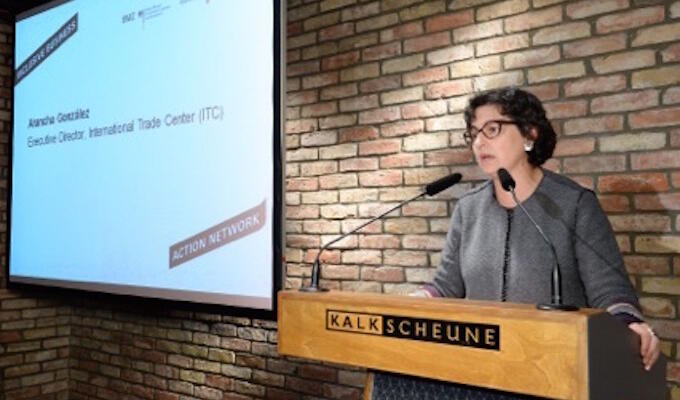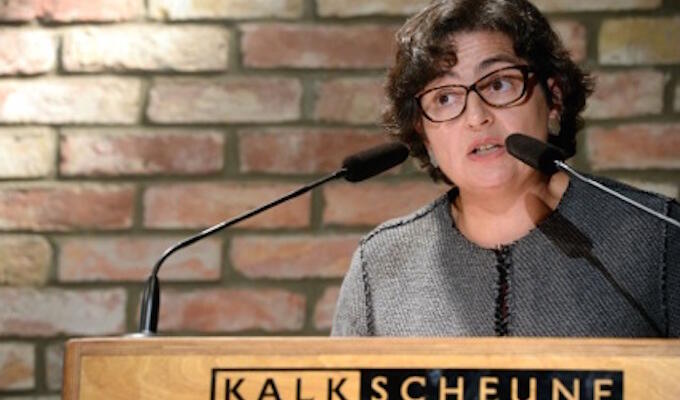

Keynote address at the launch of the Inclusive Business Action Network reception & dinner
(CHECK AGAINST DELIVERY)
I am delighted to be here for the ‘Launch of the Inclusive Business Action Network’. I would like to congratulate the Federal Ministry for Economic Cooperation and Development and the German Society for International Cooperation for making the Inclusive Business Action Network a reality. At the International Trade Centre, we know the power that inclusive trade and inclusive business can have on growth, jobs and poverty reduction. These impacts can be leveraged by networks of like-minded people.
Let me start with a story about why networks are so important. About ten years ago, Simone Cipriani, an Italian leather and footwear expert, was spending a lot of time in the Nairobi slum of Korogocho with lay missionaries who were trying to set up cooperatives to create work for people. He saw that the artisans there capable of producing top-class merchandise, even if they couldn’t compete internationally in the low-margin mass market.
In 2007, Simone came to ITC with a business plan for ethical fashion, in which selected high-end fashion industry players would commit to sourcing from micro-producers. A pilot project produced bags for Topshop, the British retailer, and brought fashion industry representatives to Nairobi to meet the micro-producers. From there, the ITC Ethical Fashion Initiative was launched a year later. A social enterprise was then set up, drawing in big-name designers like Laria Fendi, Stella McCartney, and Vivienne Westwood.
The Ethical Fashion Initiative, recognising financial constraints of poor micro-producers, negotiated payment arrangements in which buyers would put up a significant proportion of costs up front, enabling the cash-poor artisans to purchase materials. After delivery, they agreed to pay the balance immediately, rather than after the 30 or 60-day delay that is customary in the industry.
ITC works with the artisans – 90% of who are women – to help them organize, learn business skills, upgrade productivity and quality control, and connect to designers. According to project impact assessments, participants report higher wages and capacity to save.
In addition,
- while 20% of the micro-producers were earning less than US$1 a day on other activities, this increased to between US$4–$7 per order facilitated by the initiative
- 83% of the micro-producers involved are able to educate children
- 90% of the micro-producers involved improved their dwellings
- 74.4% of the micro-producers involved now have savings
- 94% of micro-artisans involved have been able to learn useful skills
- But more importantly, 100% of the women micro-producers affirmed they gained respect from their male counterparts thanks to their ability to earn a living and take care of family needs
Let me emphasise that the Ethical Fashion Initiative is not about charity. It is about dignified work at a fair wage, to make products that customers want to buy. All training activities are tied to existing contracts that need to be fulfilled.
Let me also say, it could not have happened without a network living in the fashion industry, an international development agency, and the donor community – including Germany, which came together to link 7000 artisans from around the world to fashion partners from Rome to Rio to Tokyo.
Although ‘inclusive business’ is a term that only goes back a decade or so, the concepts underlying it have been at the heart of the International Trade Centre’s work since we were founded fifty years ago.
ITC was set up by the GATT, predecessor of the WTO, and the United Nations because they recognized that despite trade liberalization, developing countries and their businesses were still not as included and still not as integrated as anticipated in the increasingly open global economy.
Participating in international trade is important and does make a difference for developing countries. A central part of the development process involves getting people and resources out of traditional subsistence activities, and into higher-value-added manufacturing, agriculture, and services. In developing countries, tradable sectors tend to be more productive.
When micro, small and medium-sized enterprises are able to connect to international markets, whether directly or by selling to locally-based multinationals, the prospects for inclusive growth are particularly high. Since MSMEs account for the lion’s share of jobs in developing countries as in developed ones, when they thrive, the benefits reach a larger section of the population.
It will not come as a surprise that this does not happen automatically. Companies need to know about market opportunities and conditions before they can try to take advantage of them. Beyond that, too, there are many preconditions for market integration: meeting mandatory and voluntary sustainability standards, accessing finance and making connections to buyers.
A recent joint study by ITC and the WTO identified three key bottlenecks that SMEs from least-developed countries face in accessing world markets: a low-quality business environment, inadequate access to finance, and insufficient institutional support to overcome trade-related challenges.
Easing these bottlenecks requires innovative cooperation and targeted investments from all of us - governments, the private sector, traditional and non-traditional aid donors, international agencies, development finance institutions, and the like. Networks can help integration happen.
None of this is easy. We will need both to take risks and come up with new modes of risk-sharing. But think of the potential rewards: the rise of an African mittelstand of internationalized SMEs would drive broad-based growth and development, and transform economic prospects for millions of Africans. It would also help the world find a new engine for trade and growth. We know that the fragmentation of production that drove rapid trade growth in the 1990s has largely matured in East Asia. The biggest potential for rapid trade expansion now exists in the regions that have thus far been relatively marginal in global supply chains: Latin America, South Asia and Africa. Helping value chains develop in these regions should be a priority for the world’s post-2015 development agenda.
Key to the development of value chains is sustainability standards.
In recent years, consumer demand for products that respond to various ethical or environmental concerns have given rise to a dizzying array of eco-labels, voluntary standards, codes of conduct, and the like.
To be sure, sustainability initiatives can create new trade opportunities while fighting environmental degradation, promoting decent labour conditions, and improving product quality. Yet in order to realize these benefits, companies need the financial and technical resources to identify and understand standards, meet them, and prove compliance with them. Developing country SMEs are especially vulnerable to getting priced out of these lucrative and growing markets.
So how do we ensure that sustainability standards live up to their name in economic, environmental, and social terms?
We must develop a set of core criteria, common to all sustainability initiatives, which define ‘sustainability’ from the perspective of everyone in the supply chain, from primary producers to consumers. We have to reduce the burden on producers and suppliers, incentivize capacity building, and understand the impacts different measures have on the ground.
To help stakeholders from across the supply chain find common ground, ITC has launched a set of ‘Trade for Sustainable Development’ principles. We hope that they can serve as a foundation for standards-setting organizations, multinationals, NGOs, and others to realize the full promise of standards in maximizing trade’s contribution to sustainable development.
The UN’s post-2015 development agenda, the Sustainable Development Goals, should serve as the basis on which to shape future sustainability standards.
Signatories to the principles would be expected to incorporate the full spectrum of social, environmental, economic, quality and ethical issues in the production, processing, and trade of goods and services. And they should do so credibly. ITC is working with GIZ and the ISEAL Alliance to develop a tool to evaluate and compare sustainability standards for both content and compliance processes.
A second core principle is transparency. For five years, ITC has worked with BMZ on mapping global voluntary standards. The product has been “Standards Map”, a neutral, online database of information on 150 odd voluntary sustainability standards and eco-labels.
Transparency is empowering: using Standards Map and self-assessment tools, we work with smallholders to sensitize them to the basic areas of good agricultural practices are required to sell on to a trader or ultimate buyer. We work with companies and industry platforms to improve access for SMEs.
To keep transaction costs to a minimum, organizations must be open to sharing good practices. Turf wars don’t help the cause of sustainable development.
The remaining principle is harmonization. There is no inherent reason why two retailers, each with their own eco-label for the same objective, cannot agree on an identical sustainability audit for a given product. We must build collaboratively on existing resources and methodologies with the aim of avoiding duplication in standards, multiplication of audits or assessment methodologies.
Of course, convergence among the large number of existing initiatives, each backed by its own constellation of interests, will not be straightforward. But if we are to foster value chain expansion and help companies manage and diversify complex value chains, convergence is inevitable.
Inclusive business needs inclusive standards.
Germany’s experience with standards and its tradition of multi-stakeholder dialogue across industries make it perfectly positioned to lead the debate on how sustainability standards for traded products can contribute more to sustainable development.
We at ITC stand ready to help at every step of the way.
Thank you.



